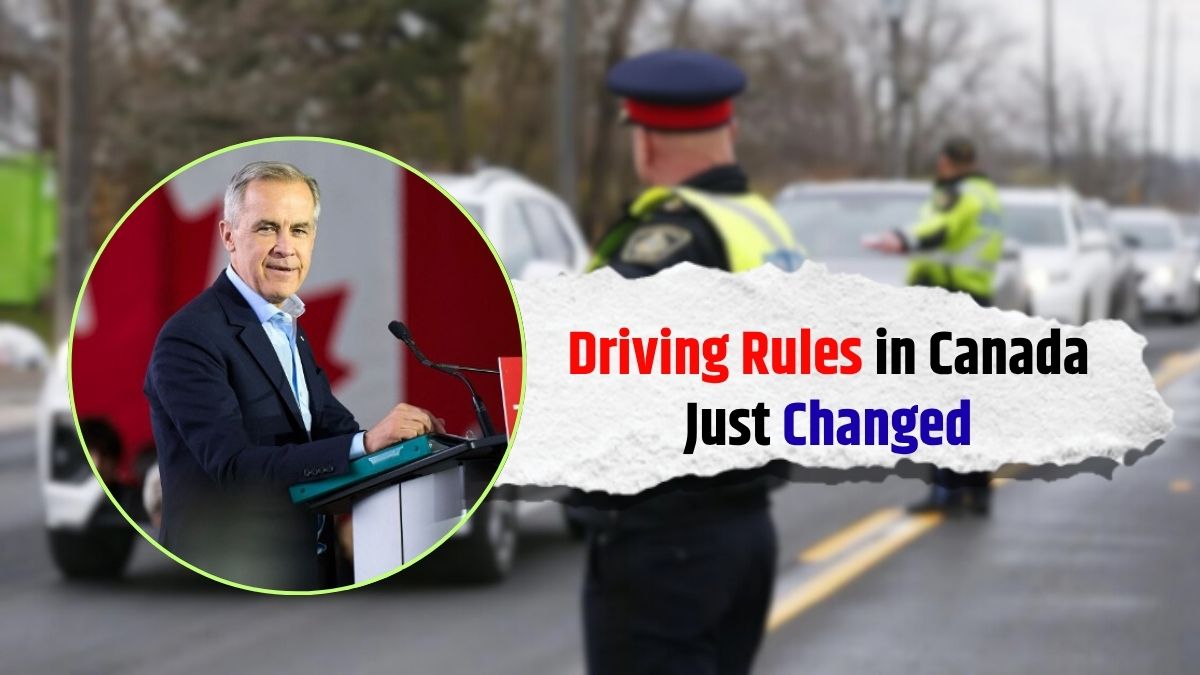Canada’s roads are set to change again as new traffic rules and enforcement protocols roll out under the Driving Law Canada 2025, beginning in August. The updated regulations aim to boost public safety, cut distracted driving, and impose stricter penalties on repeat offenders. These changes are expected to impact millions of Canadian drivers, regardless of the province they live in.
Why the New Law Was Introduced
In recent years, road safety has become a top concern for Canadian authorities. An increase in mobile phone use while driving, reckless speeding, and impaired driving has led to a call for nationwide standardization of traffic laws. The August update reflects the joint efforts of federal and provincial governments to improve consistency, enforcement, and education around road rules.
What Will Change from August 1, 2025?
The new driving law Canada 2025 introduces sweeping reforms that drivers must be aware of to avoid serious penalties. These include new fines, demerit points, documentation rules, and equipment requirements.
Tougher Fines and Penalties
One of the most noticeable changes is the increased financial penalty for distracted driving. The fine for using a mobile device while driving will jump from \$615 to \$1,000, and the demerit points will increase from 3 to 5.
Similarly, speeding in school zones will now carry a fine of up to \$750 along with a mandatory court appearance, up from a previous maximum of \$350.
Zero Tolerance for Novice and Commercial Drivers
The zero-tolerance policy for cannabis and alcohol use will now apply nationwide and be enforced uniformly across all provinces, removing the previous patchwork approach. Novice and commercial drivers will face instant suspensions and mandatory re-education if found violating the policy.
Mandatory Dash Cam Evidence
For the first time, the new law makes it mandatory to submit dash cam footage in accidents involving damages above \$2,000. This step aims to streamline investigations, reduce fraud, and clarify fault in disputed incidents. Motorists without a functioning dash cam could find themselves on the wrong side of enforcement.
New Offences and Demerit Categories
The law also introduces new offences that will now carry demerit points, including:
- Tailgating
- Reckless lane changes
- Road rage behavior
These behaviours, previously unenforceable with specific penalties, will now lead to 3 demerit points each under the August motorist regulation.
Stricter Speed and Safety Zones
Speed limits in school and construction zones are being reassessed across the country. Many will see lower limits, enhanced signage, and automated enforcement systems such as radar speed detectors and smart traffic cameras.
Improved Detection of Impaired Driving
All provinces will now adopt advanced roadside testing tools capable of detecting both alcohol and drug impairment. These devices will be standard issue for traffic officers and apply to every driver category—not just those previously monitored in select regions.
Key Comparison: Before vs. After August 2025
To better understand the impact, here’s a quick comparison of old rules versus new regulations:
| Regulation Area | Before August 2025 | After August 2025 |
|---|---|---|
| Mobile Device Use | \$615 fine + 3 points | \$1,000 fine + 5 points |
| Speeding in School Zones | Max \$350 fine | Up to \$750 fine + court appearance |
| Impaired Driving (Cannabis) | Provincial variation | Federal zero-tolerance for all drivers |
| Dash Cam Evidence | Optional | Mandatory for damages above \$2,000 |
| Tailgating/Road Rage | No defined penalty | New 3-point offence under new law |
How to Stay Compliant on the Road
To avoid legal trouble or license suspension under the new law, all drivers must:
- Install and maintain a working dash cam, especially in urban and high-traffic areas.
- Avoid mobile phone use entirely unless through approved hands-free technology.
- Observe revised speed limits, particularly in school and work zones.
- Eliminate all driving distractions, including eating, texting, or reaching for items.
- Ensure that insurance and licensing documents are up to date and easily accessible.
Mandatory Driver Re-education for Repeat Offenders
A new focus of the law is on corrective education. Drivers who accumulate too many demerit points or repeatedly violate traffic laws may be required to attend a driver safety course, regardless of their experience or age.
Impact on Public Safety and Accident Reduction
The driving law Canada 2025 has clear safety objectives:
- Reduce national traffic fatalities by 12% within the next year.
- Lower distracted driving tickets by 25%.
- Improve legal accountability through dash cam and GPS evidence.
- Promote long-term cultural change around responsible driving.
Authorities hope these measures will align Canada’s road safety standards with other OECD nations, enhancing both safety and modernization.
What This Means for Canadian Drivers
Whether you’re a seasoned commuter or a learner driver, the August 2025 updates apply to you. Ignorance of these changes won’t be an excuse. Staying informed, updated, and proactive will help you avoid heavy fines, points, or even suspensions.
Final Thoughts: Be Ready Before August 1
The new driving law Canada 2025 is not just a tweak—it’s a major overhaul of how road safety is managed in Canada. From dash cams to court dates, from zero-tolerance policies to real-time enforcement tech, drivers must prepare now.
The best way to avoid surprises? Know the law, upgrade your gear, and drive with care.
FAQs
1. What is the effective date of the new driving law Canada 2025?
The new law takes effect on August 1, 2025. All changes under the August motorist regulation will be enforced from that date.
2. Are dash cams mandatory under the new law?
Yes. In accidents involving damages above \$2,000, dash cam footage is now mandatory and must be submitted as part of evidence.
3. How much is the fine for using a phone while driving in 2025?
Drivers caught using a mobile phone will be fined \$1,000 and receive 5 demerit points under the new regulation.
4. Do these laws apply to commercial drivers too?
Yes. Commercial drivers will also face zero-tolerance policies and enhanced penalties, including license suspensions and mandatory retraining.
5. Do I need to reapply for a driver’s license because of the new rules?
No. However, if you accumulate too many demerit points or face suspension, you may need to retake driving education or testing, depending on your province’s policies.







